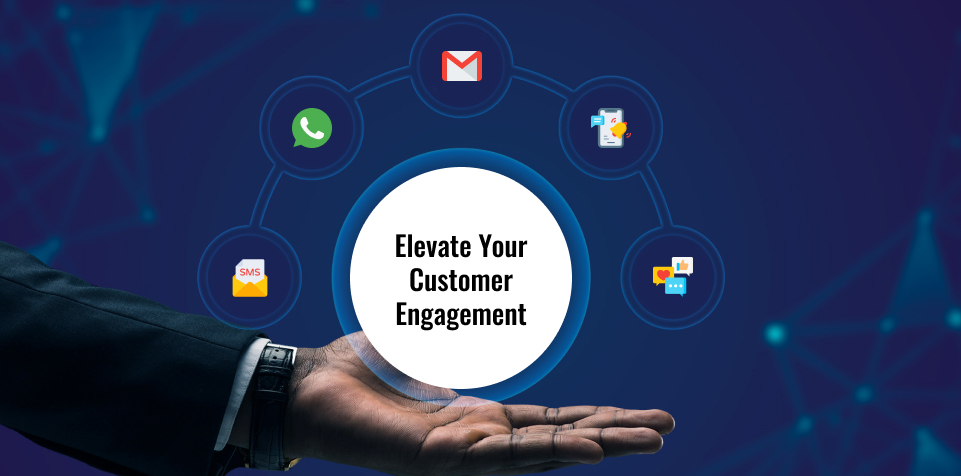Elevate Your Customer Engagement: Industry-Specific Communication Strategies
January 25, 2024

Table of Contents
- Tools and Techniques for Customer Engagement
- The Power of SMS in Customer Engagement
- Email Marketing Versatility and Personalization in Customer Communication
- Leveraging WhatsApp Fostering Personal Connections and Conversational Engagement
- Social Media Dynamics Building Brand and Community Engagement
- Mobile Apps and Push Notifications Keeping Your Brand at the Forefront
- Industry-Specific Strategies
- Combining Techniques for Maximum Impact Integrated Strategies for Holistic Engagement
- Conclusion
In today’s competitive business landscape, customer engagement and acquisition are more than just buzzwords; they are the lifeblood of any thriving enterprise. Engaging effectively with customers isn’t just about capturing their attention; it’s about building relationships, understanding needs, and delivering value that resonates with them. This blog delves into the essence of customer engagement across various industries, exploring tailored communication strategies that go beyond traditional marketing. From the personalized alerts of mobile apps in finance to the dynamic interactivity of social media in retail, we’ll uncover how different industries can leverage specific tools and platforms to not only engage but truly connect with their target audience, fostering loyalty and driving business growth in the process.
Tools and Techniques for Customer Engagement

The importance of using the right tools, techniques, or applications for enhancing customer engagement cannot be overstated. In the digital age, where customer preferences and behaviors are constantly evolving, businesses need to adapt quickly and efficiently to stay connected with their target audience. Tools like SMS, email, WhatsApp, social media, and mobile apps with push notifications offer unique ways to engage, each suited to different customer segments and business needs. By leveraging these tools, businesses can create personalized, timely, and relevant interactions, enhancing customer experience, building brand loyalty, and ultimately driving growth and success.
1. The Power of SMS in Customer Engagement

In the digital marketing realm, SMS (Short Message Service) stands as a potent tool, often overlooked yet incredibly effective for customer engagement. This direct and personal communication channel boasts unparalleled open rates, typically over 90%, dwarfing those of emails.
- Direct and Immediate Communication: SMS delivers messages straight to the customer’s pocket, ensuring immediate attention. This immediacy is vital for time-sensitive offers, reminders, or alerts, making SMS an invaluable tool for businesses aiming to convey urgent information.
- High Engagement Rates: Due to its direct nature and widespread use, SMS messages are often read within minutes of being received. This high engagement rate makes SMS an excellent channel for important notifications, promotional offers, and customer surveys.
- Personalization and Targeting: SMS marketing allows for personalized messages based on customer data. Personalized texts resonate more with recipients, increasing the likelihood of engagement.
- Wide Reach and Accessibility: Nearly everyone has access to a mobile phone capable of receiving SMS. This universality ensures a broad reach, including demographics less familiar with smartphones or internet-based messaging platforms.
- Cost-Effective: Compared to other marketing channels, SMS campaigns are relatively low-cost, offering a high return on investment. This cost-effectiveness makes SMS an attractive option for businesses of all sizes.
- Supports Other Marketing Channels: SMS can enhance the effectiveness of other marketing channels, like email or social media, by nudging customers to check an email or a social media post.
- Customer Feedback: SMS is an efficient way to gather customer feedback through quick surveys, helping businesses improve their services and products.
In summary, SMS is a powerful, direct, and personal way to engage with customers, offering high open and engagement rates, wide reach, and cost-effectiveness. Its ability to be personalized and its support for other marketing channels make it an indispensable tool in a comprehensive customer engagement strategy.
2. Email Marketing Versatility and Personalization in Customer Communication
Email marketing is a versatile and personalized communication tool, crucial for modern customer engagement strategies. It allows businesses to deliver tailored content directly to their customers’ inboxes, ranging from newsletters and promotional offers to personalized recommendations and updates. This versatility makes email a powerful platform for engaging with diverse customer segments.
Personalization in email marketing is achieved through segmentation and automation, enabling businesses to target specific customer groups based on behavior, preferences, or purchase history. This increases the relevance and effectiveness of the communication, leading to higher engagement and conversion rates.
Additionally, email marketing offers valuable analytics, such as open and click-through rates, enabling businesses to measure campaign effectiveness and make data-driven decisions. This level of insight helps in refining strategies and enhancing customer experiences.
In essence, email marketing bridges the gap between businesses and customers, fostering strong relationships through relevant, engaging, and personalized content.
3. Leveraging WhatsApp Fostering Personal Connections and Conversational Engagement

Leveraging WhatsApp in customer engagement marks a shift towards more personal and conversational interactions, offering businesses a unique avenue to connect with their audience. WhatsApp, known for its user-friendly interface and widespread use, enables direct communication, fostering a sense of familiarity and trust. This platform’s appeal lies in its immediacy and ease, allowing customers to interact with businesses as they would with friends and family.
- Personalized Messaging: WhatsApp enables personalized communication, where businesses can send tailored messages, respond to queries in real-time, and offer customized support.
- Real-time Engagement: The platform’s instant messaging capability ensures real-time engagement, crucial for customer support and quick responses to inquiries.
- Rich Media Sharing: Businesses can utilize WhatsApp’s ability to share images, videos, and documents, making interactions more engaging and informative.
- Secure Communication: With end-to-end encryption, WhatsApp offers a secure channel, crucial for sharing sensitive information and maintaining customer trust.
- Automation and Chatbots: WhatsApp can integrate chatbots and automated responses for common queries, enhancing efficiency while maintaining a personal touch.
- Data-Driven Insights: Through WhatsApp, businesses can gather insights on customer preferences and behaviors, aiding in more targeted and effective communication strategies.
Overall, WhatsApp stands as a powerful tool in the modern digital marketing arsenal, bridging the gap between businesses and customers through personalized, secure, and engaging communication.
4. Social Media Dynamics Building Brand and Community Engagement
Social media’s role in customer engagement is dynamic and multifaceted, offering an unparalleled platform for building brand and community engagement. The interactive nature of social media allows businesses to not just broadcast messages but to converse, listen, and engage with their audience. This two-way communication fosters a sense of community and belonging among customers, turning them into active participants and brand advocates.
- Brand Building: Social media serves as a powerful tool for brand storytelling. Through engaging content, live interactions, and user-generated content, brands can create a distinct voice and personality that resonates with their audience.
- Community Engagement: Platforms like Facebook, Instagram, and Twitter enable businesses to cultivate a community around their brand. By encouraging user interaction through comments, shares, and likes, companies can create a loyal customer base actively involved in the brand’s narrative.
- Customer Feedback and Insights: Social media provides a direct line to customer feedback, offering valuable insights into customer preferences, trends, and perceptions. This feedback can drive product development, marketing strategies, and customer service improvements.
- Targeted Advertising: Social media platforms offer advanced targeting capabilities for advertising, allowing businesses to reach specific demographics, locations, and interest groups, increasing the relevance and effectiveness of their marketing efforts.
- Influencer Partnerships: Collaborating with influencers can amplify a brand’s reach and credibility. Influencers act as trusted voices, lending authenticity and expanding the brand’s audience.
In conclusion, social media’s dynamic capabilities in building brand presence and fostering community engagement make it an indispensable part of modern digital marketing strategies.
5. Mobile Apps and Push Notifications Keeping Your Brand at the Forefront
Mobile apps and push notifications play a pivotal role in keeping a brand at the forefront of customer engagement. These tools offer a direct and personal way to communicate with customers, ensuring that a brand remains visible and relevant.
- Immediate Engagement: Push notifications provide real-time updates and alerts, engaging customers instantly. This immediacy is key in promoting special offers, reminders, and news directly to the user’s device.
- Personalization: Mobile apps allow for highly personalized experiences based on user preferences and behavior, enhancing the relevance of the content provided.
- Brand Presence: Having a mobile app keeps a brand consistently present on a customer’s device, increasing the chances of interaction and engagement.
- User Convenience: Apps offer a convenient way for customers to access services and information, improving the overall user experience and satisfaction.
- Analytics and Insights: Mobile apps provide valuable data on user interactions, preferences, and behavior, allowing for targeted and effective marketing strategies.
- Integration with Other Services: Apps can integrate various functionalities like shopping, loyalty programs, and customer service, offering a comprehensive brand experience.
In summary, mobile apps and push notifications are vital tools in modern digital marketing, offering direct, personalized, and convenient ways to keep a brand connected with its customers.
6. Industry-Specific Strategies
Tailoring customer engagement strategies to specific industries is crucial for effective communication and relationship building. Here’s how different sectors can optimize these strategies
- Retail: In retail, social media and visual engagement are key. Platforms like Instagram and Pinterest are ideal for showcasing products. Retailers can use visually appealing content, interactive stories, and live streams to engage customers, encourage sharing, and drive sales.
- Finance and Banking: For these sectors, trust and timely information are vital. Email and mobile app notifications can provide customers with important account updates, alerts, and personalized financial advice, enhancing customer trust and satisfaction.
- Healthcare: Personalized interactions are essential in healthcare. Mobile apps can provide tailored health tips, appointment reminders, and personalized health tracking, improving patient engagement and care.
- Real Estate: Real-time information is crucial in real estate. Instant updates via WhatsApp and SMS about new listings, price changes, or open house schedules keep clients informed and engaged in a fast-moving market.
- Education: Disseminating information is a priority in education. Email and social media can be used to share educational content, school updates, and event information, keeping students and parents informed and involved.
- Hospitality: In hospitality, creating a memorable experience is key. Social media can be used to share guest experiences, promote destinations, and engage with customers before, during, and after their stay, enhancing relationships and loyalty.
Each industry requires a unique approach to customer engagement, using the right tools and techniques to meet their specific needs and preferences.
Combining Techniques for Maximum Impact Integrated Strategies for Holistic Engagement
Combining various customer engagement techniques can create a holistic strategy that maximizes impact across different customer touchpoints. Integrating SMS, email, WhatsApp, social media, and mobile app notifications allows businesses to cater to diverse customer preferences and behaviors, ensuring no opportunity for engagement is missed.
This integrated approach should be crafted based on customer data, tailoring the communication method to suit different segments. For instance, combining real-time alerts via SMS with in-depth email newsletters can cover both immediate and detailed information needs. Social media can bolster this by providing a platform for broader community engagement and brand storytelling.
By leveraging the strengths of each channel, businesses can create a cohesive and dynamic customer engagement strategy, enhancing customer experiences, building stronger relationships, and driving business growth. The key is to ensure that all channels are aligned with the brand’s voice and objectives, providing a seamless and consistent customer journey.
Conclusion
In conclusion, effective customer engagement in today’s digital landscape requires embracing the right tools and tailoring strategies to meet the unique needs of different industries. SMS, email, WhatsApp, social media, and mobile apps each offer distinct advantages that, when integrated, can provide a holistic and impactful customer engagement experience. The key is to understand your audience, leverage the strengths of each platform, and create a cohesive strategy that resonates with customers. By doing so, businesses can build stronger relationships, enhance customer satisfaction, and drive growth. This comprehensive approach to customer engagement is not just beneficial but essential in the competitive and ever-evolving business world.








